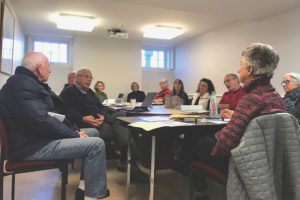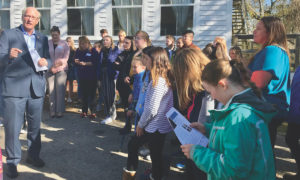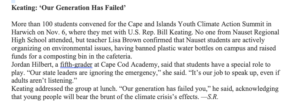WELLFLEET — Fifteen concerned citizens gathered at the Flying Fish Café in Wellfleet on Nov. 15 to discuss bills now in play at the State House that aim to curb greenhouse gas emissions. They then met with state Rep. Sarah Peake at town hall to seek her support.

Volunteer organizer Tony Rogers from the Mass. Campaign for a Clean Energy Future led the informal gathering at the Flying Fish. He outlined a bill, an Act to Promote Green Infrastructure and Reduce Carbon Emissions (H. 2810), which he hoped Peake would agree to help pass.
The bill, introduced by state Rep. Jennifer Benson (D-Lunenburg), would implement a statewide carbon tax of $20 per ton of carbon — translating to 19 cents per gallon at the gas pump — to encourage consumers to switch to more eco-friendly alternatives for heating and transport. The tax would increase each year.
The funds generated by the tax would total an estimated $2 billion annually. Of that, $400 million to $600 million would be used to construct green energy and infrastructure projects such as public transit improvements. The remaining funds would be returned to Massachusetts residents and businesses as a rebate.
Because the tax would have a greater impact on poorer families, Benson’s bill would skew rebates so that lower-income consumers would receive proportionally larger sums. Businesses facing out-of-state competition would also receive rebates.
Rogers said that Benson’s bill would cut the most emissions in the least amount of time, and that other climate-related legislation up for debate is more lenient and less specific.
Some at the meeting were skeptical about aspects of Benson’s bill. Wellfleet select board member Kathleen Bacon questioned the political feasibility of passing a carbon tax and expressed concern that local fishermen would suffer.
The group then moved to town hall to meet with Peake.
Peake noted that Benson’s bill is still in committee and is scheduled for a hearing in January. She encouraged those assembled to go to the State House to express their opinions and write letters in support of the bill.
But Peake said she thought Benson’s bill has little chance of passing in the House, since a previous tax on gasoline was partially repealed.
She then turned her attention to an Act to Create a 2050 Roadmap to a Clean and Thriving Commonwealth (H. 3983), which, she said, would set declining annual emissions goals to achieve net-zero carbon emissions by 2050. Peake felt that Roadmap 2050 has a better chance of getting passed than Benson’s bill.
“Let’s look at this in a broader way: there’s a lot of pieces of legislation that are trying to get at climate,” Peake said. “Don’t take your eyes off of the Benson bill, but maybe [Roadmap 2050] is something that can get done.”
Rogers pushed back, arguing that Benson’s bill would create meaningful change immediately, while Roadmap 2050 is still in its initial stages and would take some time to implement.
In response, Peake said that goals-oriented legislation has led to concrete action in the past, pointing to the Global Warming Solutions Act, passed in 2008.
“If you set an overarching policy, you need to take action in order to meet those goals,” she said. “I think it’s an effective way to govern and will lead to specific carbon-reduction actions.”
Peake also said she supports other bills that open up funding for municipalities around the state to build climate-resilient infrastructure and plan for the future.
Bob Higgins of Truro was enthusiastic about both the Benson bill and Roadmap 2050, which he felt would be compatible if implemented simultaneously. Paying to adapt to climate change now will cost much less than paying for it later, he said.
“Everybody is concerned about climate change, but nobody wants to pay for it,” Higgins said. “I think it’s incumbent on me and everyone else in this room to say, ‘We have to pay.’ ”


